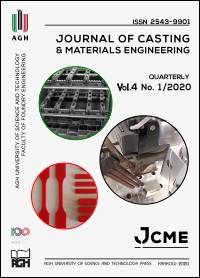Influence of Structural Characteristics on the Mechanical Properties of FDM Printed PLA Material
DOI:
https://doi.org/10.7494/jcme.2020.4.1.1Abstract
The present study reports on the influence of printing process parameters, architecture, raster, infill orientation and filling on the density, macrostructure, and mechanical properties, including impact resistance, of biodegradable polymer parts fabricated in polylactide (PLA) on a desktop printer. It complements and considers phenomenologically the results of recently published similar studies, including the use of recycled filament. In our study, complex mechanical properties for the samples printed at the same time on a Replicator 2 printer were investigated. Three samples were printed for each test. Full mechanical characteristics (tensile, compression and bend strengths and impact resistance) of the printed PLA material are reported. This is the novelty in comparison to other studies, where the samples test were printed individually or in a series for each test. The shape and thickness of the layered macrostructure, the presence of holes inside the layers, the number of shell perimeters and the fill density all influenced the tensile properties of the printed materials. These results show the possibility of printing with a 0.3, i.e. shorter printing time than 0.1, 0.15 and 0.18 mm layer thicknesses also reported, without significant decrease in mechanical properties. It is interesting to note that the compressive strengths, the yield of 70–80 MPa and a UTS 113–120 MPa for the printed material with a fill density of 94–96% are comparable with those of aluminum.Downloads
References
Masood S.H. (2014). Advances in fused deposition modelling. In: Hashmi S., Batalha G.F., Van Tyne C.J. & B. Yilbas (Eds.), Comprehensive Materials Processing. Elsevier.
Masood S.H., Mau K. & Song W.Q. (2010). Tensile properties of processed FDM polycarbonate material. Materials Science Forum, 654/656(1), 2556–2559, https://doi.org/10.4028/www.scientific.net/MSF.654-656.2556
A. Bellini & Güçeri S. (2003). Mechanical characterization of parts fabricated using fused deposition modeling. Rapid Prototyping Journal, 9(4), 252–264.
Novakova-Marcincinova L. & Novak-Marcincin J. (2014). Testing ABS material tensile strength for fused deposition modeling rapid prototyping method. Advanced Materials Research, 912/914(1), 370–373, https://doi.org/10.4028/www.scientific.net/AMR.912-914.370
Smiths W.C. & Dean R.W. (2013). Structural characteristics of fused deposition modeling polycarbonate material. Polymer Testing, 32(8), 1306–1312, https://doi.org/10.1016/
j.polymertesting.2013.07.014
Durgun I. & Ertan R. (2014). Experimental investigation of FDM process for improvement of mechanical properties and production cost. Rapid Prototyping Journal, 20(3), 228–235, http://dx.doi.org/10.1108/RPJ-10-2012-0091
Lanzotti A., Grasso M., Staiano G. & Martorelli M. (2015). The impact of process parameters on mechanical properties of parts fabricated in PLA with an open-source 3-D printer. Rapid Prototyping Journal, 21(5), 604–617, https://doi.org/10.1108/RPJ-09-2014-0135
Grasso M., Azzouz L., Ruiz-Hincapie P., Zarrelli M. & Ren G. (2018). Effect of temperature on the mechanical properties of 3D-printed PLA tensile specimens. Rapid Prototyping Journal, 24 (8), 1337–1346, https://doi.org/10.1108/RPJ-04-2017-0055
Letcher T. & Waytashek M. (2014). Material property testing on of 3D-printed specimen in PLA on entry-level 3D printer. Proceedings of the ASME 2014 International Mechanical Engineering Congress and Exposition. Volume 2A: Advanced Manufacturing. Montreal, November 14–20. ASME, https://doi.org/10.1115/IMECE2014-39379
Anderson I. (2007). Mechanical Properties of Specimens 3D Printed with Virgin and Recycled Polylactic Acid. 3D Printing and Additive Manufacturing, 4(2), 110–114, https://doi.org/10.1089/3dp.2016.0054
Polylactic Acid (PLA) Typical Properties, http://prode.me/uploads/news/9a8c705752ed9f3279f0167013f574b0.pdf [accessed 26.04.2019].
Ezeh O.H. & Susmel L. (2019). Fatigue strength of additively manufactured polylactide (PLA): effect of raster angle and non-zero mean stresses. International Journal of Fatigue, 42(4), 883–904,https://doi.org/10.1111/ffe.12958
Downloads
Published
Issue
Section
How to Cite
Accepted 2020-01-29
Published 2020-03-31


